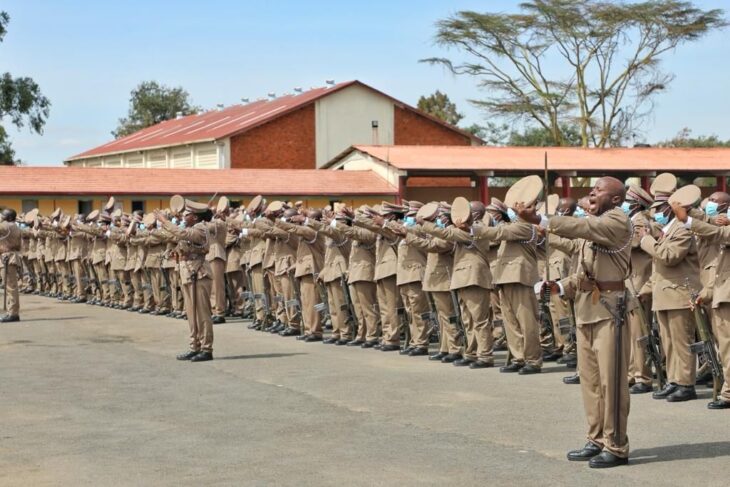The United Nations (UN) Security Council has adopted resolution 2699/20230, authorising the one-year deployment of a non-UN multinational force led by Kenyan police officers to Haiti to combat gangs and restore security.
With the approval, Kenya will deploy its force to Haiti by January next year, 2024. The force will not operate under a UN flag, but it is sponsored by the United States.
The officers will be drawn from specialised units within the General Service Unit (GSU) and the Administration Police Service (APS).
They include the AP’s Special Operations Group (SOG), the Rapid Deployment Unit (RDU), the Special Recce Team (SRT), the Special Weapons and Tactics (SWAT) team.
The council has also developed the framework for and authorized the mission, with a review after nine months.
The 15 members of the Council approved what is known as a Chapter VII provision of the UN Charter that authorises the use of force after all other measures to maintain international peace and security are exhausted, according to the UN.
Thirteen countries voted in favour while there were two abstentions.
In the voting system, according to Article 27 of the UN Charter, each member of the Security Council has one vote and the decisions of the Security Council on procedural matters is made by an affirmative vote of nine members.
According to the UN Charter, Article 23, the Security Council consists of 15 members, five of which are permanent members with veto powers.
The 5 include China, France, Russian Federation, United Kingdom of Great Britain and Northern Ireland, and the US.
There are also 10 non-permanent members, 5 of which are elected each year by the General Assembly for a two-year term. They are Albania, Brazil, Ecuador, Gabon, Ghana, Japan, Malta, Mozambique, Switzerland, and United Arab Emirates.
Haiti is not war-torn, but killings, civil lawlessness, gang violence, drugs, kidnappings, looting, extortion, and rape have been on the increase rendering the local understaffed and under-resourced police ineffective.
The first months of 2023 observed a steady increase in major crime trends and gang related incidents.
It is expected to assist Haiti’s understaffed and under-resourced police department, with only about 10,000 officers for the nation’s more than 11 million people.
Ten other nations –including Jamaica, the Bahamas and Antigua and Barbuda – have also expressed their readiness to support the mission that will be led by Kenya’s force.
The Dominican Republic has also agreed to offer assistance to the proposed UN Security Mission to Haiti, according to President Luis Abinader.
According to the resolutions, the force is expected to build the capacity of local police planning, conducting joint security support operations and also secure critical infrastructure sites and transit locations such as the airport, ports, and key intersections in Haiti.
Reports indicate that the forces will have to use robust force to disarm and neutralize the Haiti gangs which are equally armed with superior and sophisticated weapons and have in the past overpowered the local police.
Preliminary reports indicate the Kenyan team is likely to face a number of challenges including unfamiliar terrain, language barrier, resistance by a section of the local population and the gangs, among other challenges.
The Foreign and Diaspora Affairs Cabinet Secretary Dr Alfred Mutua however said the team sent is well-trained and will deal with the gangs.
“We don’t think there’s going to be a lot of violence because these gangs are powerful because they don’t have anybody who can match them. They have guns and they are well armed but they don’t have a well-ironed team to match them,” the CS said.
The UN Secretary General Antonio Guterres in an earlier briefing confirmed that the Kenyan team will, if need be, expected to use robust force to disarm and neutralize the gangs in order to restore order.
The current insecurity witnessed escalated after the July 2021 assassination of President Jovenel Moise.
Following the death of Moise, the current Prime Minister Ariel Henry took over but some of the gang leaders see him as an illegitimate leader supported by US and other Western governments, to advance their interests.
It is the Government of Haiti that requested Kenya to help stabilize and bring order to their country.
The Haiti National Police (HNP) was created in 1995 to bring public security under civilian control. Initially it was part of the Haitian Army from 1912.
The HNP is however plagued by militarism, factionalism, and corruption, and is mainly viewed by citizens as being repressive.
It officially has a force of 15,498 police officers, of which only 1,711 are women, though the number of effective officers is estimated to be much lower.
This corresponds to a low police-to-population ratio of 1.30 officers per 1,000 inhabitants which is well below the internationally recognized standard of 2.2 with further investment needed.
The US has pledged Sh14.5 billion (USD100 million) for the mission, with the Secretary of State Antony Blinken saying the Joe Biden administration was keen on ensuring that the mission is successful.
The support will include logistics, intelligence, communication, and medical assistance.
Want to send us a story? Contact Shahidi News Tel: +254115512797 (Mobile & WhatsApp)


